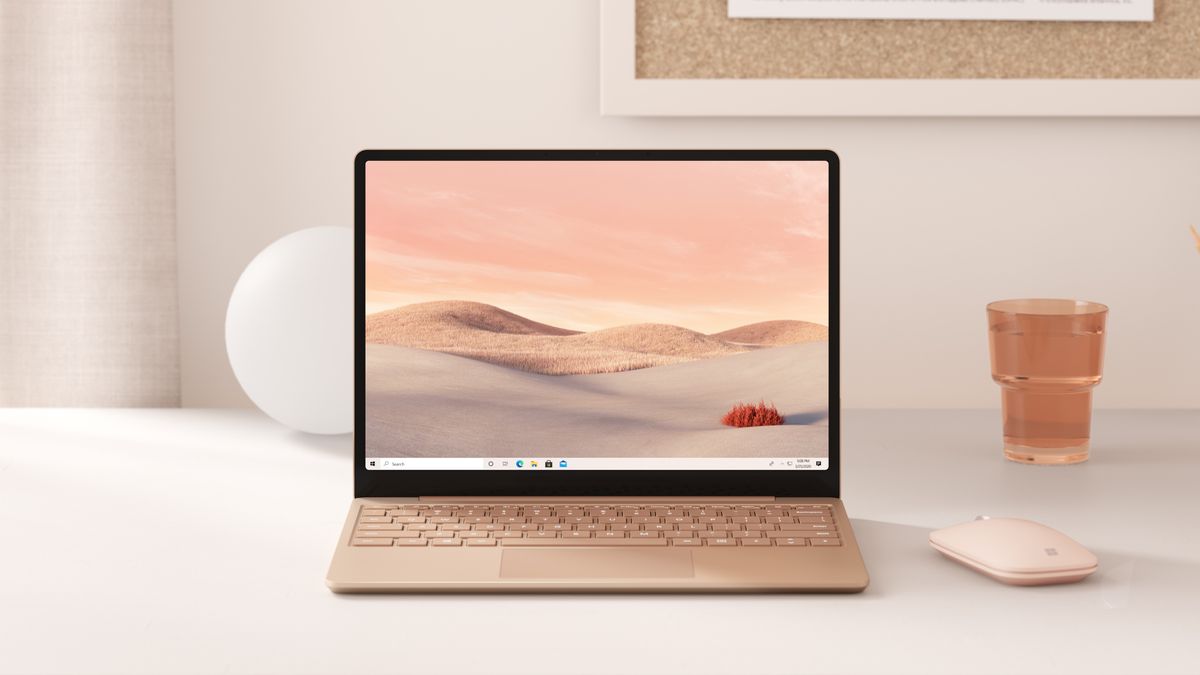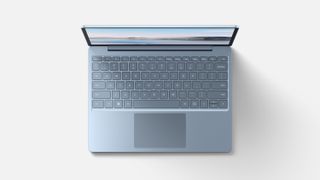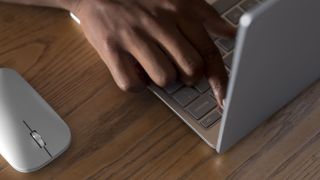Microsoft's Surface Laptop Go is the lightest and cheapest Surface laptop yet
The Surface Laptop Go is surprisingly affordable — but is it worth the compromises?

Microsoft's Surface laptops have targeted the premium market, but that changes with the new Surface Laptop Go, a 12.4-inch laptop starting at just $549. The Surface Laptop Go has the same DNA as the Surface Laptop 3 but makes a few compromises to keep the price down.
You can think of the relationship between the Surface Laptop Go and Surface Laptop 3 as being similar to that of the Surface Go 2 and Surface Pro 7 — you get a similar product but with lesser specs and at a lower cost.
Price: $549 (starting)
Display: 12.4-inch, 1536 x 1024-pixel
Ports: USB-C, USB-A, headphone, Surface Connect
CPU: Intel Core i5-1035G1
RAM: 4GB, 8GB, 16GB (commercial-only)
Storage: 64GB (eMMC), 128GB, 256GB
Battery life: 13 hours (rated)
Size: 10.95 x 8.1 x 0.62 inches
Weight: 2.45 pounds
- Which Surface Is Right for You? Pro X vs Pro 7 vs Laptop 3 vs Go 2
- Best laptops 2020
- Microsoft Surface Go 2 review
At such an affordable price, the Surface Laptop Go is meant for people who need a basic laptop for everyday computing but want something that feels expensive. If it's a success, the Laptop Go could be the ideal laptop for students and a smart choice for those who aren't convinced by Chromebooks.
Surface Laptop Go price and release date
With a starting price of $549, the Laptop Go is the least expensive Surface laptop. That base model has an Intel Core i5-1035G1 CPU, 4GB of RAM and 64GB of eMMC storage. Unlike upgraded configs, the base version doesn't include a fingerprint reader.
Upgrading to 8GB of RAM and a 128GB SSD raises the price to $699. In general, we strongly recommend making this leap if the $149 doesn't dent your budget too much. If you need more storage, the jump from 128GB to a 256GB SSD raises the price to $899.
The Surface Laptop Go is available for pre-order today and will be available to purchase at major retailers on October 13.
Surface Laptop Go design
One look at the Laptop Go and you'll immediately recognize it as belonging to the Surface line. What you might not expect is how inexpensive it is. We haven't seen the notebook in the flesh but images sent to us by Microsoft show what looks like a miniature version of the Surface Laptop 3.
Stay in the know with Laptop Mag
Get our in-depth reviews, helpful tips, great deals, and the biggest news stories delivered to your inbox.
In typical Surface style, the Laptop Go has a simple, refined design with clean lines. Centered on the lid is a chrome Microsoft logo, acting as the only bit of adornment on the exterior of the laptop. What caught my eye on the interior are the minimal bezels around the display. I expect this feature on premium notebooks but not a company's most budget-friendly model.

I also can't ignore the color options. Available in Ice Blue, Sandstone and Platinum, the Laptop Go continues Microsoft's tradition of offering unique hues. I'm looking forward to seeing these colors in person (if I'm lucky, Microsoft will send me the Ice Blue model).
As expected, Microsoft had to cut some corners to keep the Laptop Go's price down. While the lid is aluminum, the deck is made of a polycarbonate resin with glass fiber and 30% postconsumer recycled content. I'll reserve my judgment for how the Surface Laptop Go feels once I get in a review unit, but for now, I'm impressed by its appearance.

At 11 x 8.1 x 0.6 inches and 2.5 pounds, the Surface Laptop Go is Microsoft's lightest laptop ever. For comparison, the 13.5-inch Surface Laptop 3 is 12.1 x 8.8 x 0.6 inches and 2.9 pounds.
Surface Laptop Go ports
Microsoft doesn't like to add more features than is necessary but I wish it was more generous with ports. The Laptop Go has only one USB-C input, a USB-A port, a headphone jack and a Surface Connect charging port.
Surface Laptop Go display
Smaller than the other Surface laptops, the Surface Laptop Go has a 12.45-inch PixelSense display with a 1536 x 1024-pixel resolution. That doesn't make for the highest pixel density, but we haven't been let down by any Surface displays thus far, so I have high hopes.

Also worth mentioning is the 3:2 aspect ratio, meaning the display is taller and more narrow than your standard 16:9 panel. While not for everyone, 3:2 panels are ideal for viewing text and numbers on webpages or spreadsheets.
Surface Laptop Go keyboard and touchpad

My fingertips haven't tapped this keyboard yet but everything tells me it's going to be a good one. Microsoft hasn't let me down and it claims the Laptop Go's backlit keys offer 1.3 millimeters of travel, which is identical to those on the Surface Laptop 3. If it's the same keyboard, I'll be happy — those chiclet-style keys are bouncy and responsive.

At 4.5 x 3 inches, the glass touchpad is generously sized. Again, Microsoft usually nails the touchpad so I'm expecting good things when our review unit comes in.
Surface Laptop Go specs and performance
The Surface Laptop Go is powered by an Intel Core i5-1035G1 CPU with UHD graphics. I have mixed feelings about this chip choice. On the positive side, it's a Core i5, so it shouldn't have problems zipping through Windows 10 and running most programs.

But as you might have noticed, this is a 10th Gen processor, not the new 11th Gen Tiger Lake chips Intel just announced. I recognize that this is a mainstream laptop, but it's strange to be talking about a 10th Gen chip when so many other newly announced laptops boast 11th Gen processors.
A bigger performance concern is the 4GB of RAM in the base model. It just isn't enough for running full Windows 10 (once you disable S mode). We suggest upgrading to 8GB of LPDDR4x memory (or 16GB if you're a commercial customer). We also recommend most people upgrade from the stock 64GB of eMMC storage to a 128GB or 256GB SSD.
Surface Laptop Go battery life
The Surface Laptop Go is rated at 13 hours of battery life. We hope to see comparable results when we put it through our own runtime test. When the battery is running low, you can fast charge the Go to an 80% charge in just over an hour.
Outlook
I like what Microsoft is doing with the Surface Laptop Go, but I'm skeptical of the $549 base model. Not only does it shortchange you with 4GB of RAM (in 2020!) and only 64GB of flash storage but the entry-level config doesn't come with a fingerprint sensor. If you can spend the extra cash, the $699 model with 8GB of RAM and a 128GB SSD seems like a much better value.
That said, we'll need to take a closer look at the upgraded configurations when we get the Surface Laptop Go in for review. If it performs well, the Surface Laptop Go could be an excellent Chromebook alternative or a compelling option for students. We know Microsoft can make a great premium product, but can it do what Apple hasn't: sell an affordable laptop that delivers a premium experience? We're eager to find out if Microsoft's dip into mainstream computing is a success.
Phillip Tracy is the assistant managing editor at Laptop Mag where he reviews laptops, phones and other gadgets while covering the latest industry news. After graduating with a journalism degree from the University of Texas at Austin, Phillip became a tech reporter at the Daily Dot. There, he wrote reviews for a range of gadgets and covered everything from social media trends to cybersecurity. Prior to that, he wrote for RCR Wireless News covering 5G and IoT. When he's not tinkering with devices, you can find Phillip playing video games, reading, traveling or watching soccer.
